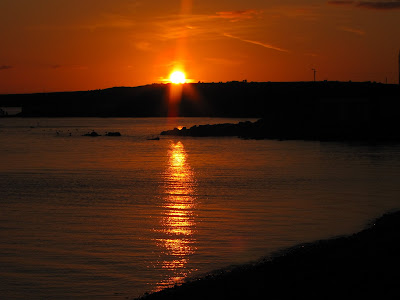What happens to us when we die? Where are our loved ones now? Will we know them when we go to heaven? In St. John’s Gospel Jesus says, ‘In my Father’s house there are many dwelling places. If there were not would I have told you that I am going to prepare a place for you. And if I go and prepare a place for you, I will come back and take you to myself, so that where I am you may be too’ (Jn 14:2-3).
I am going to prepare a place for you. It is a place and in that place God has a place specially for us. That’s what Jesus said. So when we die we don’t just disappear into nothing, or some semi-conscious place of rest, but to a place where we will be more alive than we are here. Jesus said, ‘I came that you may have life and have it to the full’ (Jn 10:10). In heaven all that Jesus wants for us will be completely fulfilled. We will no longer suffer, but only experience joy, because that’s what God originally created for us. We lost it, through what we call Original Sin, but Jesus won it back for us by shedding his blood. So that place which we call heaven, now awaits us if we choose it, but we must choose it.
Does everyone go to heaven? Not according to what Jesus taught. We have the choice to reject God and if we do, God will respect our decision, but if we do, we will also lose all that heaven is. So if heaven is complete fulfilment in God’s presence, joy, happiness, light, the joy of being with our loved ones again, then to lose that is to be left with the opposite, which is darkness, hatred, pain, isolation. If heaven is real and we have free will, then it must be possible not to go to heaven. If everyone automatically went to heaven, then we would not have free will. So heaven is real and so is hell. Unfortunately today many people do not take the idea of hell seriously and that is a big mistake. If it is not real, then Jesus lied. Jesus did not lie.
What about purgatory? That is another teaching that many people dismiss today. No sin can exist in God’s presence. If we die and we still have sin on our soul, or have not atoned for sin, we would not be able to bear God’s presence. It would be unbearable.
Imagine that you are out working in the back yard, fixing a broken sewage pipe. You are in your worst clothes, filthy and sweaty, with sewage on you. Someone comes rushing out to say that the Pope is here and wants to meet you. Would you run out as you are, or would you say, ‘Wait, give me a few minutes to get ready.’
Here is a more extreme example: imagine Hitler a few hours before he dies, suddenly realizes what he has done and the suffering that he has caused and he repents and begs for God mercy. God promises his mercy to anyone who repents and asks for it sincerely. Would it make sense that when he died a few hours later he would go to heaven right away? That would make a mockery of God’s justice and God is not mocked. It says in the book of Sirach (5:5): ‘Do not be so confident of forgiveness that you add sin to sin.’ So it makes sense that those who are not ready to come into God’s presence in heaven, but who need to atone for sin, would have to go through some kind of purification. That’s what purgatory is: a purgation, a purifying.
When people die we tend to presume they are in heaven right away. But that is not always the case and many people do not die in such a state of holiness that they are able to come directly into God’s presence. That’s also why it is so important that we pray for the dead, as the Lord has taught us.
There was a lady called Maria Simma (1915-2004) who lived in Austria as a peasant for most of her life. She tried religious life but was unable to continue because she was too weak physically. She actually tried three different convents but had to leave each in turn. She ended up doing simple work and living on her own. She only received education to the age of 12. Her mother had great devotion to praying for the souls in Purgatory and she seems to have inherited this too.
When she was 25 years old (1940) she woke up to find a man in her room pacing back and forth. She said, ‘Who are you and what are you doing here?’ and she tried to grab him, but there was just air. She says that she then went back to bed. The following night he appeared again. So the next day she told her priest what had happened and asked him what she should do. He told her that if it happened again, to ask the man what he wanted of her. The next night the man appeared again and she said, ‘What do you want from me’ and the man asked her to have mass offered for him. He was a soul from purgatory. For the following several years only two or three souls appeared to her, but then from 1954 onward they continually appeared to her. In reading about her I found it very interesting to learn what some of the souls said to her, because they often explained why they were in need of prayer. One case in particular struck me. She recalls how a young man appeared to her asking her to pray for him. He told her the circumstances of his death. He lived in mountain village in the Alps. He wasn’t a very religious man and in fact lived a pretty wild lifestyle.
One year there were a series of avalanches. One night while he was asleep there was another avalanche and he woke up to hear the screams of people nearby who were trapped. He jumped up and rushed out to help them. His mother tried to stop him screaming, ‘Don’t go out, you will be killed too!’ However, he went anyway and he was killed. But when he appeared to her, he explained to Maria Simma that God in his mercy had allowed him to die at a time when he was being most giving, most self-less. This action had redeemed so much of what he had done wrong in his life. Sacrificing himself had atoned for much of the sin he had committed.
When my Grandmother used to hear people using the expression, ‘rest in peace,’ she would sometimes say, ‘I don’t want to “rest in peace” I want to be alive and active!’ I think she had the right idea. What God has created us for in the world to come is something unimaginably wonderful and that is why God goes to such lengths to make sure we get there. The greatest thing God has done for us after giving us the gift of life, is making sure that we can reach that happiness and that is only possible through the death and resurrection of Jesus. God will do everything to make sure we reach that happiness, but God cannot force us because of the free will He has given us, so we must be careful to make the right choices ourselves.
November is the month where we traditionally remember those who have died and it is good that we do. Starting with the feast of All Saints on Nov 1st we celebrate all those who are in heaven; probably many if not all of our family members who are now saints. Anyone who is in heaven is a saint. Even though we officially recognise just a few of them, everyone there is a saint. Then on Nov 2nd we have the feast of All Souls where we pray for all who have died.
Purgatory is in fact a great gift from God and not something we should be afraid of. The Church also teaches us that we can help those who are still at that stage of Purgatory by praying for them. That is why we pray for the dead in every mass we offer throughout the whole year and we remember them especially during the month of November.
In St.Paul’s first letter to the Christians in Corinth, he says the following: ‘If our hope in Christ has been for this life only, we are of all people the most to be pitied’ (1 Cor 15:19). In other words if we think that this life is what it’s all about, we have completely missed the point of our faith. What God teaches us is that we are all the time preparing for the world to come. This life is a kind of school or training ground, where we are free to love or not, to choose for God or not and the choices we make have consequences. If we keep in mind that something wonderful awaits us, which is what we will experience sooner or later, that helps us not to get too immersed in the world. We all get distracted and bogged down with the worries of this life, but we need to keep reminding ourselves of what our life is about, so that we don’t waste it. If we keep in mind the thought and hope of the world to come, where we will experience life in a way we can never experience it here, it helps us to keep the right focus. Death is not something for us to be afraid of; rather it will be the beginning of something unimaginably wonderful.
I leave you with this thought: Why do those who have died not come back to tell us what it is like? I’m sure it is because they know that it is not necessary for us to know. The ‘not knowing’ is part of the struggle of faith. For now we try to believe and trust in what the Lord has taught us: ‘Do not let your hearts be troubled or afraid. There are many rooms in my Father’s house. If there were not I would have told you that I am going to prepare a place for you?’ (John 14:1).
Eternal rest grant to them O Lord and may perpetual light shine upon them. May they enjoy the happiness that awaits us all.















